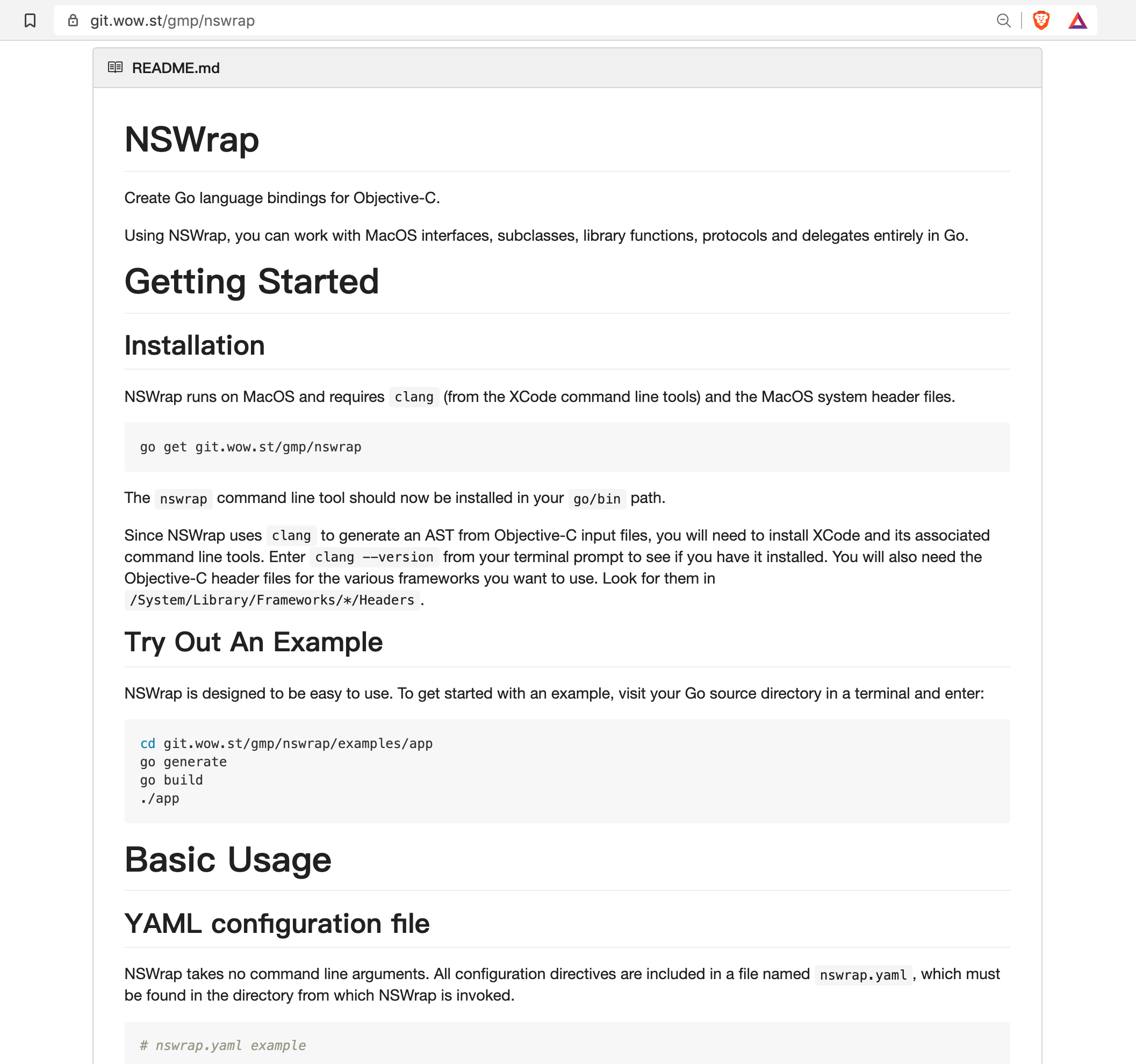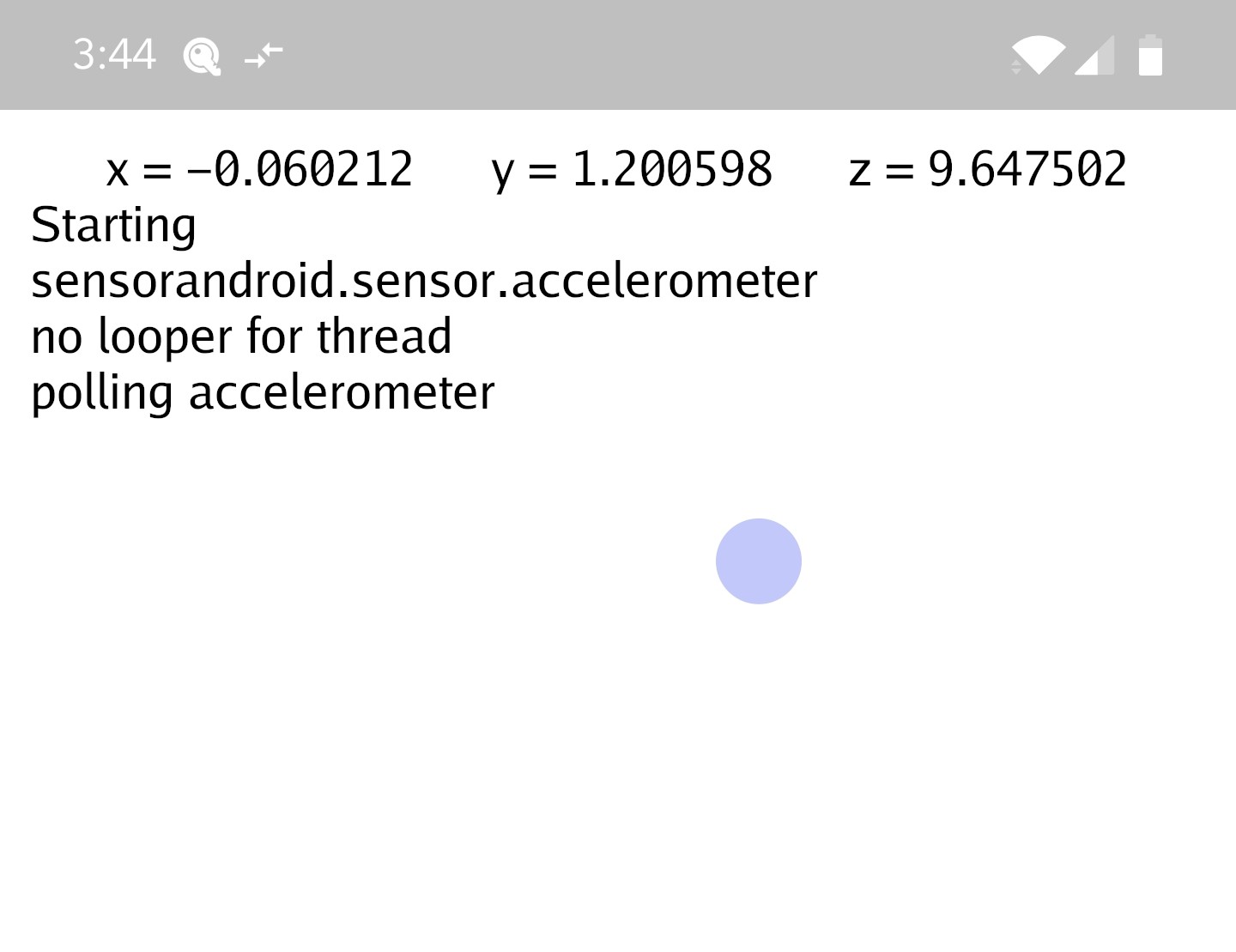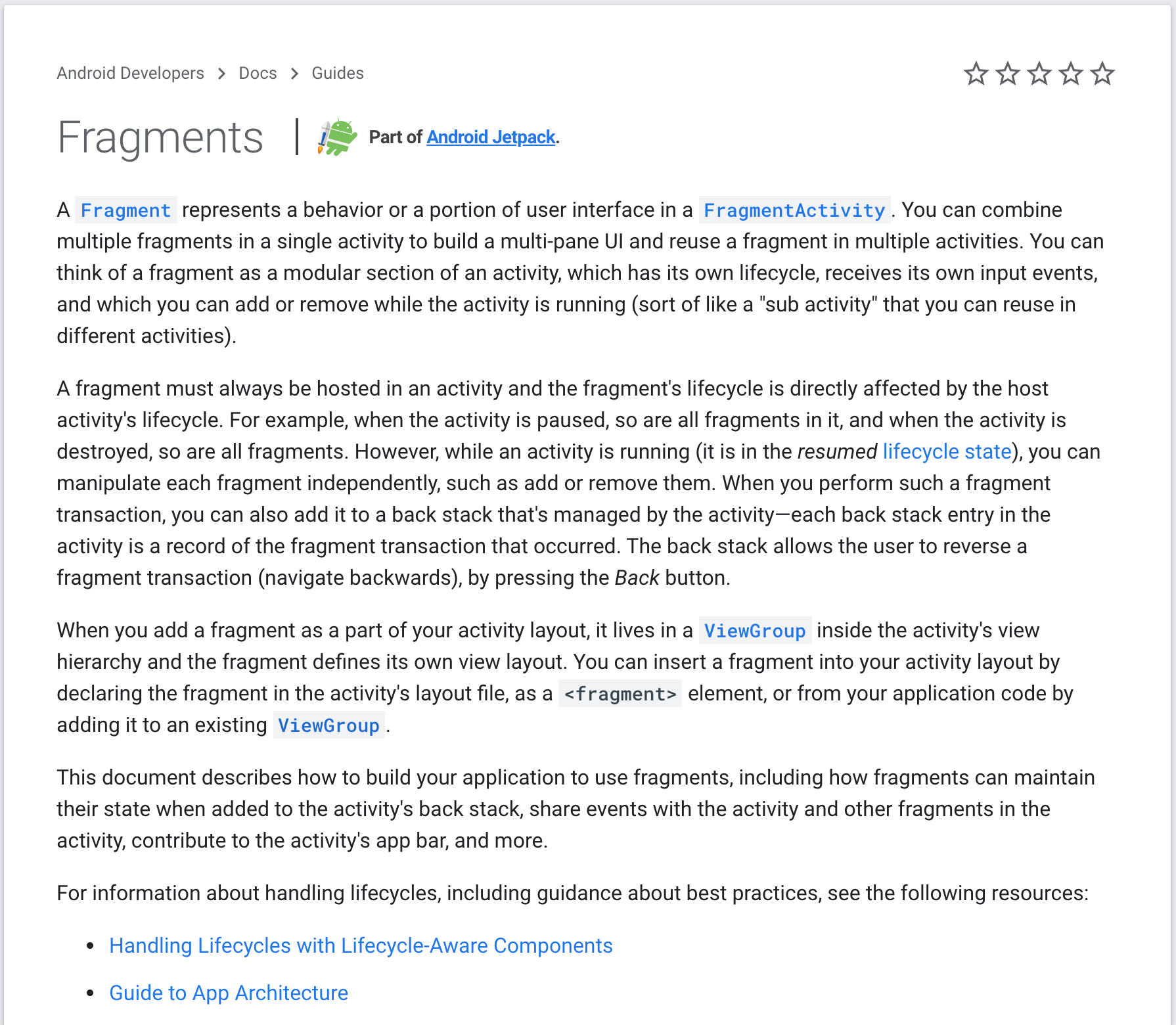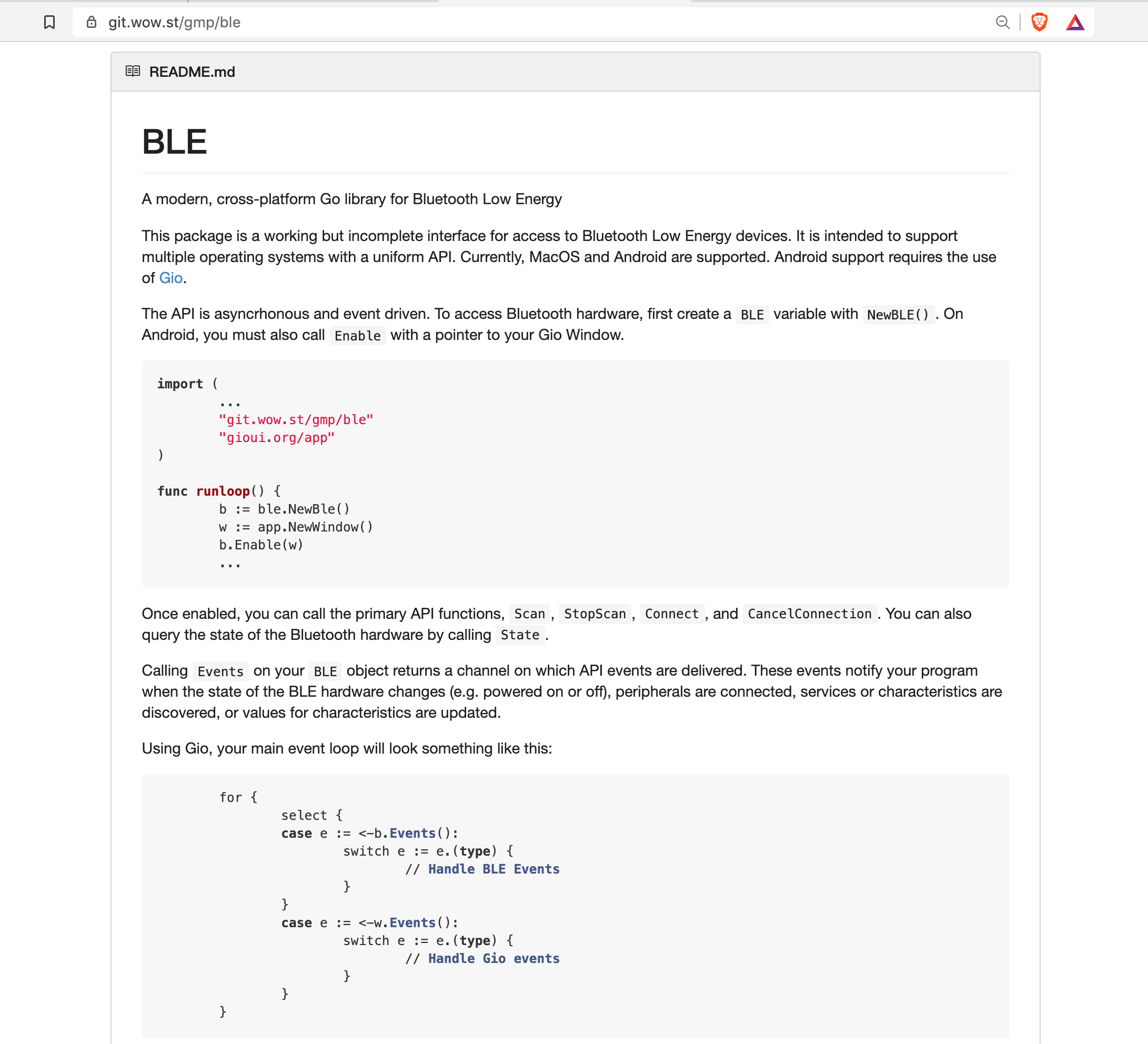Android for Gio programmers
Native Development Kit (NDK): direct access from cgo
- limited Android API access
Java Native Interface: call Java code via cgo
- custom Java classes
Java fragments: extend the main Gio Activity
- permissions and application lifecycle
NDK — sensor.h
$ANDROID_HOME/ndk-bundle/sysroot/usr/include/android/sensor.h
# android/sensor.h
#if __ANDROID_API__ >= 26
/**
* Get a reference to the sensor manager. ASensorManager is a singleton
* per package as different packages may have access to different sensors.
*
* Example:
*
* ASensorManager* sensorManager = ASensorManager_getInstanceForPackage("foo.bar .baz");
*
*/
ASensorManager* ASensorManager_getInstanceForPackage(const char* packageName) __INTRODUCED_IN(26);
#endif
/**
* Returns the default sensor for the given type, or NULL if no sensor
* of that type exists.
*/
ASensor const* ASensorManager_getDefaultSensor(ASensorManager* manager, int type);
/**
* {@link ASensorManager} is an opaque type to manage sensors and
* events queues.
*
* {@link ASensorManager} is a singleton that can be obtained using
* ASensorManager_getInstance().
*
* This file provides a set of functions that uses {@link
* ASensorManager} to access and list hardware sensors, and
* create and destroy event queues:
* - ASensorManager_getSensorList()
* - ASensorManager_getDefaultSensor()
* - ASensorManager_getDefaultSensorEx()
* - ASensorManager_createEventQueue()
* - ASensorManager_destroyEventQueue()
*/
typedef struct ASensorManager ASensorManager;
NDK — nswrap

NDK — Android-specific Go code
os_android.go
import ndk "git.wow.st/gmp/android-go/android27"
func sensorLoop() {
// the Android Looper is thread-local
runtime.LockOSThread()
pkg := ndk.CharWithGoString("st.wow.git.sensors")
manager := ndk.ASensorManagerGetInstanceForPackage(pkg)
pkg.Free()
sens := ndk.ASensorManagerGetDefaultSensor(manager, ndk.ASENSOR_TYPE_ACCELEROMETER)
stp := ndk.ASensorGetStringType(sens)
labchan <- "sensor" + stp.String()
var looper *ndk.ALooper
var queue *ndk.ASensorEventQueue
looper_id := 1
var rate ndk.Int32_t = 60
setup := func() {
looper = ndk.ALooperForThread()
if (looper == nil) {
labchan <- "no looper for thread"
looper = ndk.ALooperPrepare(ndk.ALOOPER_PREPARE_ALLOW_NON_CALLBACKS)
}
queue = ndk.ASensorManagerCreateEventQueue(manager, looper, looper_id)
ndk.ASensorEventQueueEnableSensor(queue, sens)
ndk.ASensorEventQueueSetEventRate(queue, sens, 1000000/rate) // microseconds
}
setup()
...
NDK — Android main polling loop
os_android.go (86 total lines)
func sensorLoop() {
...
for {
var zero ndk.Int
id := (int)(ndk.ALooperPollOnce(-1, &zero, &zero, (*unsafe.Pointer)(unsafe.Pointer(nil)))) // poll forever
if (id == ndk.ALOOPER_POLL_ERROR) { // set up a new looper
labchan <- "getting a new looper"
setup()
continue
}
if (id == looper_id) {
var event ndk.ASensorEvent
if (ndk.ASensorEventQueueGetEvents(queue, &event, 1) != 1) {
continue
}
accel := (&event).Acceleration()
senschan <- vector{float64(accel.X()), float64(accel.Y()), float64(accel.Z())}
}
}
NDK — Gio app setup
main.go
func eventloop() {
w := app.NewWindow( app.Size(unit.Dp(400), unit.Dp(400)), app.Title("Hello"))
th := material.NewTheme(gofont.Collection())
var ops op.Ops
var accel vector
var cx, cy, cvx, cvy, cs float32 // circle position, velocity and radius
cx = 200
cy = 200
cs = 50 // circle size (radius)
circle := func(gtx C, width, height float32) D {
// clip circle position and bounce off of the edges
if (cx < cs) { cx = cs; cvx = (-0.5) * cvx }
if (cy < cs) { cy = cs; cvy = (-0.5) * cvy }
if (cx > width - cs) { cx = width - cs; cvx = (-0.5) * cvx }
if (cy > height - cs) { cy = height - cs; cvy = (-0.5) * cvy }
blue := color.RGBA{0x3f, 0x51, 0xb5, 0x80}
r1 := f32.Rectangle{f32.Point{cx - cs, cy - cs}, f32.Point{cx + cs, cy + cs}}
clip.Rect{ Rect: r1, NE: cs, NW: cs, SE: cs, SW: cs}.Op(gtx.Ops).Add(gtx.Ops)
paint.ColorOp{Color: blue}.Add(gtx.Ops)
paint.PaintOp{Rect: r1}.Add(gtx.Ops)
var ret D
ret.Size.X = int(cs * 2)
ret.Size.Y = int(cs * 2)
return ret
}
...
NDK — Gio app main loop
main.go (174 total lines)
...
ticker := time.NewTicker(time.Second / 60)
var t, told int64
t = time.Now().UnixNano()
for {
select {
case <- ticker.C:
told = t
t = time.Now().UnixNano()
elapsed := float32((t - told) / 1000000)
cvx = cvx - float32(accel.x/1000) * elapsed
cvy = cvy + float32(accel.y/1000) * elapsed
cx = cx + cvx * elapsed
cy = cy + cvy * elapsed
w.Invalidate()
case x := <-senschan:
accel = x
case e := <-w.Events():
switch e := e.(type) {
case system.FrameEvent:
gtx := layout.NewContext(&ops, e)
... // draw everything
e.Frame(gtx.Ops)
}
}
}
NDK — Building an APK
$ gogio -target android -minsdk 27 .
$ adb install sensors.apk

JNI — Java Native Interface
Use JNI from cgo to:
- Access Android Java APIs (with limitations)
- Call methods on your own Java classes
To use it:
- create (or acquire) a Java Virtual Machine (JavaVM)
- use the JavaVM to obtain a JNI Native Interface struct (JNIEnv)
- call function pointers inside the JNIEnv struct
$ANDROID_HOME/ndk-bundle/sysroot/usr/include/jni.h
typedef const struct JNINativeInterface* JNIEnv;
typedef const struct JNIInvokeInterface* JavaVM;
/*
* Table of interface function pointers.
*/
struct JNINativeInterface {
jobject (*NewObject)(JNIEnv*, jclass, jmethodID, ...);
jclass (*GetObjectClass)(JNIEnv*, jobject);
jboolean (*IsInstanceOf)(JNIEnv*, jobject, jclass);
jmethodID (*GetMethodID)(JNIEnv*, jclass, const char*, const char*);
jobject (*CallObjectMethod)(JNIEnv*, jobject, jmethodID, ...);
jboolean (*CallBooleanMethod)(JNIEnv*, jobject, jmethodID, ...);
jbyte (*CallByteMethod)(JNIEnv*, jobject, jmethodID, ...);
jchar (*CallCharMethod)(JNIEnv*, jobject, jmethodID, ...);
jshort (*CallShortMethod)(JNIEnv*, jobject, jmethodID, ...);
jint (*CallIntMethod)(JNIEnv*, jobject, jmethodID, ...);
jlong (*CallLongMethod)(JNIEnv*, jobject, jmethodID, ...);
jfloat (*CallFloatMethod)(JNIEnv*, jobject, jmethodID, ...);
jdouble (*CallDoubleMethod)(JNIEnv*, jobject, jmethodID, ...);
void (*CallVoidMethod)(JNIEnv*, jobject, jmethodID, ...);
jobject (*GetObjectField)(JNIEnv*, jobject, jfieldID);
jboolean (*GetBooleanField)(JNIEnv*, jobject, jfieldID);
jbyte (*GetByteField)(JNIEnv*, jobject, jfieldID);
jchar (*GetCharField)(JNIEnv*, jobject, jfieldID);
jshort (*GetShortField)(JNIEnv*, jobject, jfieldID);
jint (*GetIntField)(JNIEnv*, jobject, jfieldID);
jlong (*GetLongField)(JNIEnv*, jobject, jfieldID);
jfloat (*GetFloatField)(JNIEnv*, jobject, jfieldID);
jdouble (*GetDoubleField)(JNIEnv*, jobject, jfieldID);
...
JNI — git.wow.st/gmp/jni
JNI — Basics
my/java/AClass.java:
package my.java;
public class AClass {
public int Num() {
return 17;
}
}
main.go:
package main
//go:generate javac my/java/AClass.java
import (
"fmt"
"git.wow.st/gmp/jni"
)
func main() {
vm := jni.CreateJavaVM()
err := jni.Do(vm, func(env jni.Env) error {
cls := jni.FindClass(env, "my/java/AClass")
if cls == 0 {
return fmt.Errorf("Class not found")
}
mid := jni.GetMethodID(env, cls, "", "()V")
if mid == nil {
return fmt.Errorf("Initializer not found")
}
inst, err := jni.NewObject(env, cls, mid)
if err != nil {
return err
}
mid = jni.GetMethodID(env, cls, "Num", "()I")
if mid == nil {
return fmt.Errorf("Method not found")
}
res, err := jni.CallIntMethod(env, inst, mid)
if err != nil {
return err
}
fmt.Printf("Result: %d\n", res)
return nil
})
if err != nil {
fmt.Printf(err.Error())
}
}
JNI — Using JNI on Android
gogio looks for .jar files in your package
directory and across all imports. Every class from these .jar files
will be bundled with your apk
$ apktool d hrm.apk
$ find hrm/smali -type f
hrm/smali/org/gioui/GioView$1.smali
hrm/smali/org/gioui/GioView.smali
hrm/smali/org/gioui/GioView$3.smali
hrm/smali/org/gioui/GioView$4.smali
hrm/smali/org/gioui/GioView$2.smali
hrm/smali/org/gioui/Gio.smali
hrm/smali/org/gioui/GioActivity.smali
hrm/smali/org/gioui/Gio$1.smali
hrm/smali/org/gioui/GioView$InputConnection.smali
hrm/smali/st/wow/git/ble/BlessedConnect$3.smali
hrm/smali/st/wow/git/ble/BlessedConnect$1.smali
hrm/smali/st/wow/git/ble/BlessedConnect$2.smali
hrm/smali/st/wow/git/ble/BlessedConnect.smali
hrm/smali/timber/log/Timber.smali
hrm/smali/timber/log/Timber$Tree.smali
hrm/smali/timber/log/Timber$DebugTree.smali
hrm/smali/timber/log/Timber$1.smali
hrm/smali/com/welie/blessed/BluetoothPeripheral$1$9.smali
hrm/smali/com/welie/blessed/BluetoothPeripheral$11.smali
hrm/smali/com/welie/blessed/BluetoothCentral$4.smali
...
JNI — JNI Limitations on Android
Key limitation: cannot override Activity methods:
onActivityResultonRequestPermissionResult- Lifecycle methods:
onCreate,onDestroy, etc.
Java Fragments
There are lots of gaps in the NDK and limitations with JNI. Fragments can access the rest.

Java Fragments — Basics
os_android.go
import (
"gioui.org/app"
"git.wow.st/gmp/jni"
)
func registerFragment(w *app.Window) {
vm := jni.JVMFor(app.JavaVM())
w.Do(func(view uintptr) {
err := jni.Do(vm, func(env jni.Env) error {
cls := jni.FindClass(env, "st/wow/git/fragment/AFrag")
mth := jni.GetMethodID(env, cls, "", "()V");
inst, err := jni.NewObject(env, cls, mth)
mth = jni.GetMethodID(env, cls, "register", "(Landroid/view/View;)V");
jni.CallVoidMethod(env, inst, mth, jni.Value(view))
return nil
})
if err != nil { ... }
})
}
AFrag.java
package com.afrag.AFrag;
import android.app.Activity;
import android.app.Fragment;
import android.app.FragmentTransaction;
import android.content.Context;
import android.util.Log;
import android.view.View;
public class AFrag extends Fragment {
public void register(View view) {
Activity act = (Activity)view.getContext();
FragmentTransaction ft = act.getFragmentManager().beginTransaction();
ft.add(this, "AFrag");
ft.commitNow();
}
@Override public void onAttach(Context ctx) {
super.onAttach(ctx);
}
}
Java Fragments — Permissions (Java)
Here we are going to connect to Bluetooth low-energy peripherals using a library called Blessed (https://github.com/weliem/blessed-android)
We need permission to access Bluetooth hardware, which, on Android,
requies ACCESS_FINE_LOCATION, which is a "dangerous" permission. See:
developer.android.com/reference/android/Manifest.permission
We need to request access to this permission at runtime.
BlessedConnect.java:
package st.wow.git.ble;
import android.app.Fragment;
import com.welie.blessed.BluetoothCentral;
import com.welie.blessed.BluetoothCentralCallback;
import com.welie.blessed.BluetoothPeripheral;
import com.welie.blessed.BluetoothPeripheralCallback;
public class BlessedConnect extends Fragment {
final int PERMISSION_REQUEST = 1;
final int REQUEST_ENABLE_BT = 2;
@Override public void onAttach(Context ctx) {
super.onAttach(ctx);
if (ctx.checkSelfPermission(Manifest.permission.ACCESS_FINE_LOCATION) != PackageManager.PERMISSION_GRANTED) {
requestPermissions(new String[]{Manifest.permission.ACCESS_FINE_LOCATION}, PERMISSION_REQUEST);
}
System.loadLibrary("gio");
installComplete(this);
}
public void onRequestPermissionsResult (int requestCode, String[] permissions, int[] grantResults) {
if (requestCode == PERMISSION_REQUEST) {
boolean granted = true;
for (int x : grantResults) {
if (x == PackageManager.PERMISSION_DENIED) {
granted = false;
break;
}
}
}
}
static private native void installComplete(BlessedConnect p);
}
Java Fragments — Permissions (Go)
We need to ask gogio to add all required permissions to
AndroidManifest.xml
os_android.go:
import (
"gioui.org/app"
_ "gioui.org/app/permission/bluetooth"
)
AndroidManifest.xml:
<?xml version="1.0" encoding="utf-8" standalone="no"?><manifest xmlns:android="http://schemas.android.com/apk/res/android" android:compileSdkVersion="29" android:compileSdkVersionCodename="10" package="git.wow.st.hrm" platformBuildVersionCode="29" platformBuildVersionName="10">
<uses-permission android:name="android.permission.BLUETOOTH"/>
<uses-permission android:name="android.permission.BLUETOOTH_ADMIN"/>
<uses-permission android:name="android.permission.ACCESS_FINE_LOCATION"/>
<uses-feature android:glEsVersion="0x00030000" android:required="false"/>
<uses-feature android:name="android.hardware.bluetooth" android:required="false"/>
<uses-feature android:name="android.hardware.bluetooth_le" android:required="false"/>
<application android:icon="@mipmap/ic_launcher" android:label="Hrm">
<activity android:configChanges="keyboardHidden|orientation" android:label="Hrm" android:name="org.gioui.GioActivity" android:theme="@style/Theme.GioApp" android:windowSoftInputMode="adjustResize">
<intent-filter>
<action android:name="android.intent.action.MAIN"/>
<category android:name="android.intent.category.LAUNCHER"/>
</intent-filter>
</activity>
</application>
</manifest>
Java Fragments — Gio app
main.go is 482 lines. No platform-specific code is required in the Gio app.
import (
"gioui.org/app"
"git.wow.st/gmp/ble"
)
func eventloop()
w := app.NewWindow()
...
b := ble.NewBLE()
b.Enable(w)
select {
case e := <-b.Events():
switch e := e.(type) {
case ble.UpdateStateEvent: ...
case ble.DiscoverPeripheralEvent: ...
case ble.ConnectEvent: ...
case ble.ConnectTimeoutEvent: ...
case ble.DiscoverServiceEvent: ...
case ble.DiscoverCharacteristicEvent: ...
case ble.UpdateValueEvent: ...
}
w.Invalidate()
case e := <-w.Events():
switch e := e.(type) {
case system.DestroyEvent:
return
case system.FrameEvent:
gtx := layout.NewContext(&ops, e)
... // draw everything
e.Frame(gtx.Ops)
}
}
}
Java Fragments — BLE API
func (b *BLE) Enable(w *app.Window)
func (b *BLE) State() string
func (b *BLE) Events() chan interface{}
func (b *BLE) Scan()
func (b *BLE) StopScan()
func (p Peripheral) DiscoverServices()
func (p Peripheral) DiscoverCharacteristics(serv Service)
func (p Peripheral) SetNotifyValue(c Characteristic)
func (b *BLE) Connect(p Peripheral) bool
func CancelConnection(p Peripheral)
func Disconnect(p Peripheral)

Links
/